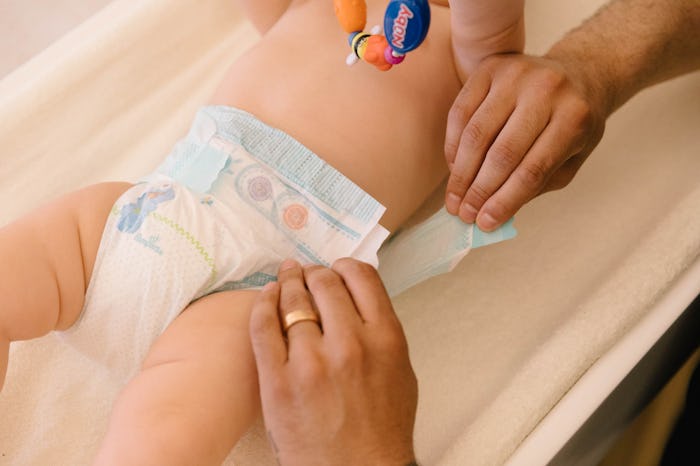When you're expecting a baby, it's common to want to prepare yourself as much as possible. This typically includes getting a nursery ready, reading some parenting or birthing books, pre-making meals for the postpartum period, and stocking the house with baby clothes, toys, and diapers. It's hard to really know what to get, though, because without having met your baby, how do you really know what size she is or what she likes? Diapers can be especially tricky to pre-buy as babies differ so much in birth weight and subsequent growth. Like, how long are babies in newborn diapers anyway?
Well, it certainly depends. According to Parents, the average baby (about 6 to 8 pounds) will go through about six to seven packs of newborn diapers, which is anywhere from 216 to 252 diapers. Of course this is just an average, and depending on the size and build of your baby's body, this number could be lower or higher. Slim and tall babies might benefit from a smaller size to prevent leaks at the legs, and chubbier babies might need a bigger size to keep comfortable.
To make it even more confusing, you may find that different brands fit your babies in different ways. Though diaper companies try to keep sizes consistent, there will always be some discrepancy between brands, both in fit and function. If you're having problems with the diaper you're currently using, switching brands might help.
Many times, babies don't even fit in newborn size diapers at birth. If your baby ends up being born a little early or a little late, they may not start off in newborn diapers. Smaller babies (around 6 pounds or less) might be more secure in Size P (preemie) diapers, and larger babies (around 8 pounds or more) could probably start wearing Size 1 diapers right away (though it's not necessary that they do since newborn diapers are said to fit babies up to 10 pounds).
Some parents-to-be have success in stocking diapers before their babies are born, but there's always a risk involved. Without knowing how big or small your baby will be, or how fast they will outgrow certain sizes, you might end up buying more of one size, or having a lot of one size leftover. As Consumer Reports noted, unless you have multiples, an economy sized pack of newborn diapers might be more than enough (or even too much).
Once your baby has moved up a size and you find a brand you like, buying the largest available package will be always be more cost effective. And try refraining from moving up to the next size too quickly — larger diapers will always cost you more (and might be more prone to leaking).
There are a few ways to tell whether or not your little one is ready for the next size, too, according to Dr. Sears' website. First, check for adequate rear coverage. Sure, their little bums look adorable hanging out of their diapers, but let's face it, that's probably not good when it comes to poo-splosion protection. Then, check for tightness at the waistband; if it's too tight, you'll feel tightness when you tug on it or it may leave slight red marks on your baby's skin. Of course, if your little one has outgrown the weight limit recommendations or is leaking through often, it might be time to move up.
With most things baby-related, you won't really know what to expect or what you'll need until you start along the journey. It's basically impossible to predict what your baby will be like, what size they will be at any given time, or how fast they will grow. Using your best judgement beforehand, and then adjusting as you go, is likely your best option when it comes to diapers (and nearly everything else, to be honest).
Check out Romper's new video series, Bearing The Motherload, where disagreeing parents from different sides of an issue sit down with a mediator and talk about how to support (and not judge) each other’s parenting perspectives. New episodes air Mondays on Facebook.
